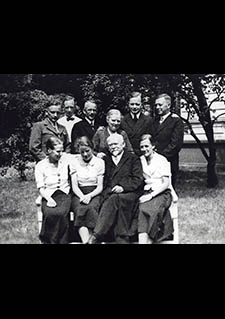In His Father’s Footsteps: Political Editor
Gotthard Martin Gauger was born on August 4, 1905 in Elberfeld, the fifth child of Joseph (1866–1939) and Emeline Gauger (1877–1964). In 1898, His father had switched from working for the church in Württemberg to being the inspector of the “Evangelische Gesellschaft” in Elberfeld. He became its director in 1907.
An editor of periodicals (especially “Licht und Leben” and the “Gotthard-Briefe” as of 1922) and a publisher of theological works, he combatted the Church’s liberalism and later the German Christians from a strictly conservative political standpoint. He was taken into custody briefly in 1934 for publicly disapproving of the merging of the offices of chancellor and president of Germany. “Licht und Leben” was banned temporarily. The periodical was discontinued in 1938 for political reasons.
Martin Gauger studied law and economics at the universities in Tübingen (1924), Kiel (1925), London (1928), Berlin and Breslau. His exam for his Diplom degree in economics (1927) was followed by his first law exam in 1930.
A law clerk and legal assessor, he followed in his father’s footsteps as an editor. Already interested in politics as a school student, he was in charge of the “historical and political monthly overview” in the right-wing conservative, anti-Semitic “Gotthard-Briefe” from March of 1930 until early 1933 as well as for commentaries on German domestic policy as of 1931 and on economic policy as of 1933.
In September of 1930, Gauger, who had distanced himself from right-wing conservatism during his days as a university student, characterized the SPD in an overview of the German police scene since 1919 as the major conservative power in Germany because no other party was more ponderous. At the same, it had shifted from its revolutionary ideals to prosperous and agreeable realities. He averred that the DNVP had in fact unraveled into all of its individual constituent parts.
As a codicil, he also commented on the NSDAP: Enthusiasm is there, but also a severe lack of spirit; courage is there, but no deeds, unless they were acts of violence; masses are there, but no heads. Aims are indistinct at best [...], anti-Semitism without shape and moderation [...], an unscrupulous assault on the personalities of political opponents [...], dictatorship is desired, but there is no dictator. In short, National Socialism is merely the outcry of a desperate youth. [...] Will National Socialism ever become more than a portent? [Parteiensystem, 170, 174, 177].
Source / title
- © Gauger Family Archive / Reproduced in: Böhm, Boris: „Die Entscheidung konnte mir niemand abnehmen ...“. Dresden 1997, p. 17

